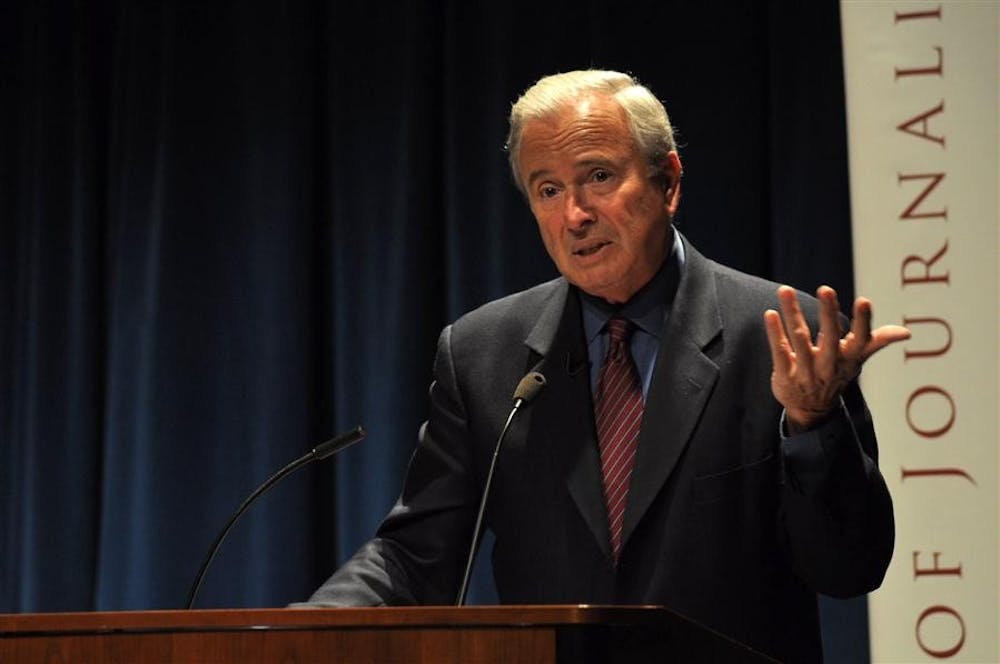Author Ken Auletta remembers being at a dinner party that Larry Page, co-founder of Google, also attended. When asked what each guest considered to be the most important thing that needed to happen in the world, Page answered this: colonizing Mars.
“He couldn’t do that,” Auletta said. “But Google has colonized Earth.”
Auletta, author of “Googled: The End of the World as We Know it,” spoke about the impact Google has had on the world in regards to education, advertising and journalism.
“It made everything accessible,” he said. “It became the equivalent of the remote control.”
Auletta visited IU as part of the School of Journalism speaker series.
“We knew the Google book was important and certainly timely,” said School of Journalism Dean Brad Hamm.
Hamm said Auletta is a great writer and over the past few decades has profiled some of the biggest people in the field.
With countless information only a click away, Auletta said Google transformed education, both for the good and bad. He referred to a moment when his nephew wrote a paper that received a good grade. When Auletta asked him where he found the information, his nephew admitted to using Google.
“It’s not the same,” Auletta said. “You lose something.”
He emphasized the importance of digging deeper with books and research. Yet he said he understood the upside of Google and how exposure to many more voices online was also a benefit.
Sophomore Lily Carreo agreed.
“I like books, I work at the Lily Library and I like the books, but my father likes e-books,” she said.
Her favorite part of Auletta’s speech included his discussion on transformative technology. Auletta said during a conversation with someone he interviewed, the person asked him if he had ever heard of anything more transformative than the Internet.
“What about electricity?” Auletta commented.
In regards to advertising, Auletta said advertisers love the system that leaves a trail of interested consumers. With ads on the side of pages, advertisers can find out what was searched, who clicked on their ads and how many times.
There are some mistakes that traditional media has made, he said. This includes the pessimistic attitude of the media that tends to believe Google is a cold businessman. What he found was that the people working at Google were interested in making the Internet more efficient.
Yet the technology can have drawbacks.
He mentioned broadcast TV and how networks will not be able to afford four-million-dollar shows when the audience continues to shrink due to their time online.
“Technology does not necessarily make it better,” he said.
Auletta said during his research for the book he realized that although the Google engineer understood efficiency, he did not understand journalism. Auletta said the founder of Google does not understand the importance of copyright for a writer. A man he interviewed for the book proposed he publish it online for free. Auletta said this was impossible, asking who would pay his salary and who would market his book.
There are many forms of media suffering from the online technology, and Auletta predicted many more magazines and radio stations to close.
“Some will be saved,” he said. “Some can survive.”
Resources are shrinking for these media though, and he admits it is a tough time for journalists. Yet there is a good side to the Internet, he said.
He referred to pictures put online from phones, recording moments that a journalist was not able to. Although this multiplies the number of journalists a person has access to, it also takes away the authority of a trained journalist.
“The world is happening at great speed,” he said.
Auletta said he has hope that newspapers will survive based on credibility and loyalty.
“When I look at the world today I actually come to think there are two types of people,” he said. “The first is lean back and he whines and complains that Google is evil. The other is lean forward. He remains optimistic because, yes it’s scary, but there are many opportunities. The Googles in this world see opportunity.”
Author: Google changed everything

Get stories like this in your inbox
Subscribe





